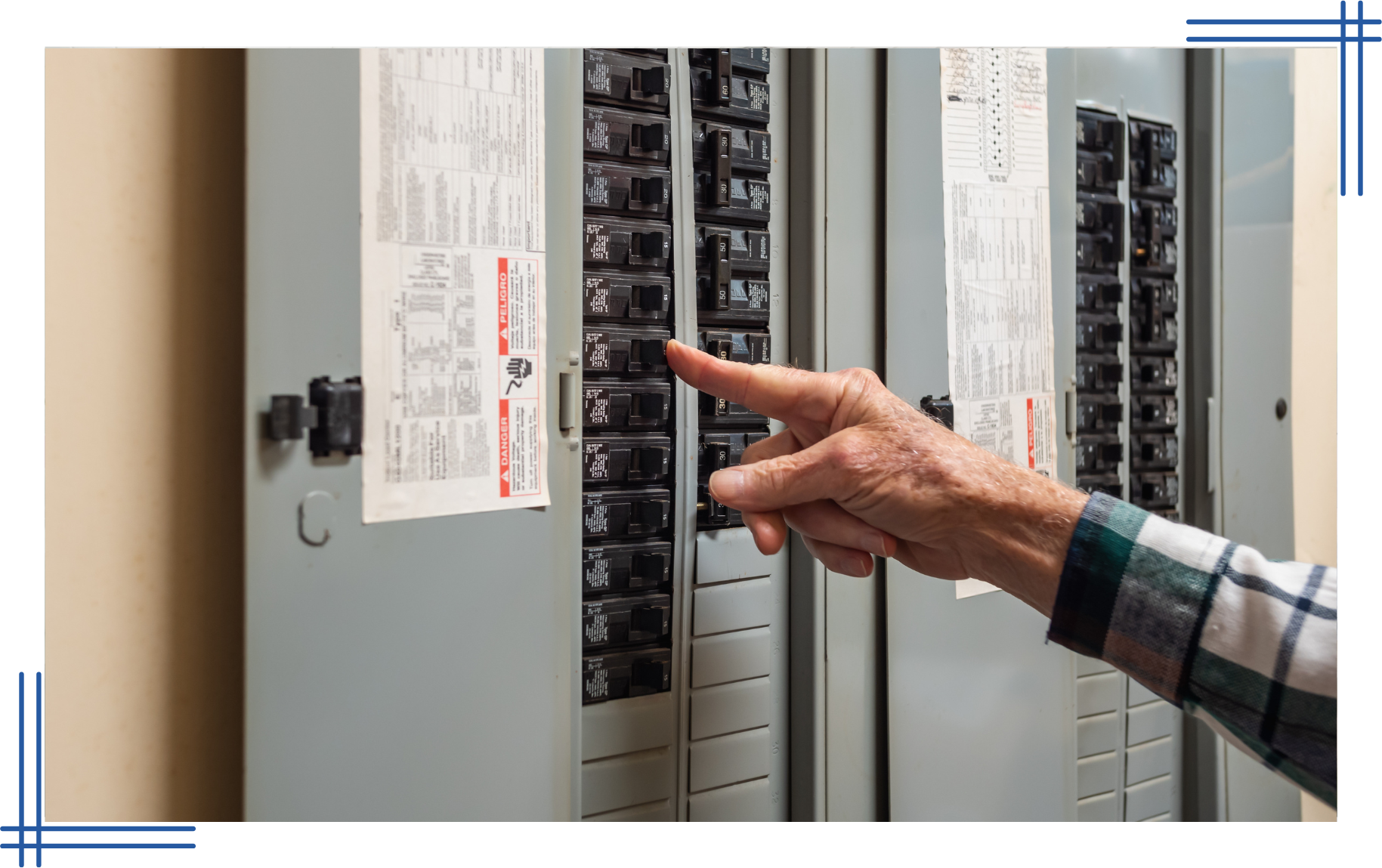
Slide title
Write your caption hereButton
Electrical Panel Services

Slide title
Write your caption hereButton
Electrical Panel Services
An electrical panel, often recognized as the heart of a building's electrical system, serves a fundamental purpose in distributing electricity throughout a facility. Commonly referred to as a breaker panel, fuse box, or distribution board, it ensures that electricity from the utility company is routed to various circuits within a home or commercial space. The primary function is to distribute this power efficiently while safeguarding the building against potential hazards.
The concept dates back to the 1800s when electricity first started being used for lighting and power in homes. Early versions were nothing like the sophisticated systems we have today; they were simple, fuse-based boxes without many of the safety features now standard. They often use a specific color-coding system for wires to ensure safety and simplify maintenance. For instance, black wires typically represent live or hot wires, white often denotes neutral, and green or bare copper is used for grounding.
Reasons To Upgrade
One of the most vital reasons to upgrade is to enhance the safety of a property. Older panels may not be equipped to handle the increased demands of modern appliances and devices, leading to potential hazards such as fires or circuit breakdowns. Upgrades incorporate modern circuit breakers that can handle higher amperages and more effectively protect against overloads and short circuits.
As technology advances, so does the need for systems that can support a higher load. New appliances and high-tech devices often require more power than older systems can provide. Upgrading the panel ensures that there is sufficient capacity to support these modern necessities without frequent tripping of circuit breakers.
Building codes evolve to incorporate the latest safety standards and technological advancements. An upgrade ensures compliance with these codes, which not only enhances safety but is also essential for legal compliance, particularly during renovations or when selling the property.
Benefits Of Upgrading
An updated panel is a significant selling point for potential buyers who value safety and convenience. It indicates that the property is well-maintained and equipped to handle contemporary electrical demands, potentially increasing its market value.
Insurance companies often favor homes and businesses that pose a lower risk. An upgraded electrical panel reduces the risk of electrical fires and related hazards, which can lead to lower insurance premiums and better coverage options.
Upgrades For Various Types And Sizes Of Spaces
Our standard upgrade service focuses on replacing outdated electrical panels with modern, more capable systems. These upgrades are designed to handle the increased load of contemporary household appliances and office equipment. We ensure that homes and small businesses stay safe and are capable of supporting the latest technological advancements, such as high-definition televisions, home automation systems, and computer networks.
For larger facilities such as factories or industrial complexes, we offer heavy-duty upgrades. These are specifically engineered to meet the high-power demands of heavy machinery, extensive lighting setups, and other industrial equipment. Our heavy-duty panels are robust, offering enhanced capacity and durability to withstand the rigorous demands of industrial operations. This service is vital for industries where power needs are intensive and continuous, ensuring that operations run smoothly without interruption due to insufficient power supply.
In line with the latest trends in smart technology, we provide smart panel options that allow for centralized control of various systems. These integrate with other smart home or office systems to control lighting, climate, security, and more from a single interface. This integration not only brings convenience but also enhances energy efficiency and control, allowing users to manage their settings for optimum comfort and cost-effectiveness.
For unique or complex setups, custom panel arrangements are available, which are tailored from the ground up to accommodate unusual layouts, special installations like home theaters, solar integrations, or unique artistic lighting setups. Our team works closely with property owners to develop a solution that fits their exact needs, ensuring that every aspect of the system is optimized for both performance and aesthetics.
Common Misconceptions
A common misconception is that adding more circuit breakers will increase the overall power capacity of a building. However, the total capacity is determined by the panel’s amperage rating, not the number of circuit breakers it contains. Simply adding more breakers without properly upgrading the service capacity can lead to safety hazards. Some believe that if an old electrical panel isn’t causing problems, there’s no need to replace it. However, as standards evolve and more devices are used within a home or facility, they may not provide adequate protection or capacity, making upgrades essential for safety and efficiency.
At Summit Electrical Solutions, the process of upgrading your panel is designed to be thorough and seamless, ensuring you receive the most effective solution tailored to your needs. Here’s how we approach the consultation and upgrade process. It begins with an initial consultation where our team of experts conducts a detailed evaluation of your existing system. This assessment helps us understand your current setup, identify any potential issues, and determine the specific requirements of your property.
Based on the assessment, we provide personalized recommendations that cater to your specific needs. Along with our recommendations, you can receive a comprehensive quotation that outlines the costs and timeline. Once you approve the plan, our certified technicians will proceed with the installation. After installation, a final inspection is conducted to ensure everything is functioning correctly. We also provide follow-up support to address any questions or concerns you might have post-installation.
Contact us today to schedule your initial consultation.
Frequently Asked Questions
Q1: What was the historical significance of the first electrical panels?
A1: The first panels emerged during the late 19th century as electricity became more prevalent in homes and businesses. Initially, they were rudimentary and primarily used to control lighting. Over time, as electrical appliances became more common, the complexity and safety features evolved significantly. These set the groundwork for modern electrical safety management.
Q2: Can an electrical panel be too old to function safely today?
A2: Yes, older ones can pose significant safety risks, particularly those that are more than 25 to 30 years old. They might not comply with current electrical codes and may not be designed to handle the load of modern appliances, which can lead to overheating and fire hazards. Upgrading is often recommended to ensure safety and efficiency.
Q3: What is the difference between a fuse box and a modern circuit breaker panel?
A3: The main difference between a fuse box and a modern circuit breaker panel lies in how they handle electrical overloads. Fuse boxes use fuses that melt when overheated by excess current, thus breaking the circuit. Once a fuse blows, it must be replaced. Circuit breaker panels, on the other hand, use switches that trip to interrupt the circuit during an overload, which can be reset without needing replacement. This makes circuit breakers more convenient and safer for repeated use.
All Rights Reserved | Summit Electrical Solutions
